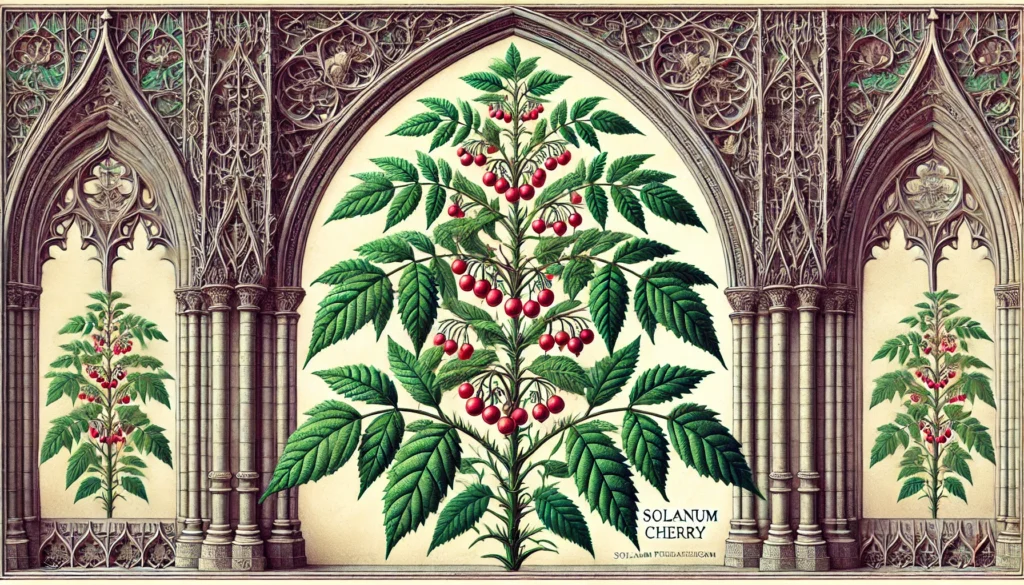

Home » Cat Plants » The Toxic Dangers of the Winter Cherry Plant to Cats

The Winter Cherry Plant (Solanum pseudocapsicum) is toxic to cats if ingested. This ornamental plant, also known as Jerusalem Cherry or Christmas Cherry, poses a moderate toxicity risk to felines.
The plant’s toxicity stems from the presence of solanine, a glycoalkaloid poison found in its berries and leaves. Winter Cherry plants are commonly found as decorative houseplants, especially during the holiday season, making them a potential hazard for curious cats in indoor environments.
Ingestion may cause mild gastrointestinal upset, but is generally not life-threatening.
Ingestion can result in mild symptoms like vomiting, diarrhea, or drooling. Rarely fatal but may require veterinary care.
Eating these plants can lead to more pronounced symptoms like abdominal pain, lethargy, or difficulty breathing. Veterinary intervention may be necessary.
Ingesting even small amounts can cause severe symptoms like organ damage, seizures, or cardiac failure without rapid treatment.
All parts of these plants are extremely poisonous to cats and can quickly lead to death, even with immediate veterinary care.
** Please note: Please note that toxicity level can vary based on the amount ingested and the specific cat. It's always best to keep these plants completely inaccessible to cats and seek immediate veterinary care or call the poison hotline if you suspect your cat has ingested any part of a toxic plant.
If a cat ingests parts of the Winter Cherry plant, particularly the berries, they may experience various symptoms of poisoning. It’s crucial for cat owners to be aware of these signs and seek immediate veterinary care if they suspect their pet has consumed this toxic plant.Common symptoms of Winter Cherry plant poisoning in cats include:
When presented with a cat showing symptoms of Winter Cherry plant poisoning, a veterinarian will likely follow these steps to diagnose and treat the condition:

A: Yes, Winter Cherry is harmful to cats. The plant contains toxic alkaloids that can cause severe gastrointestinal upset and other serious symptoms if ingested.
A: Symptoms of Winter Cherry poisoning in cats include vomiting, drooling, and difficulty breathing. Immediate veterinary attention is necessary to prevent serious complications.
A: Winter Cherry is highly toxic to pets, including cats and dogs. Ingestion of any part of the plant can lead to severe health issues and requires prompt medical intervention.
A: Cats can recover from Winter Cherry poisoning with timely and appropriate veterinary treatment. However, the recovery process depends on the amount ingested and the speed of care provided.
A: It is not safe to keep a Winter Cherry plant in a house with cats due to its toxic nature. To ensure your cat’s safety, consider opting for non-toxic plants like spider plants or Boston ferns.
A: If your cat ingests Winter Cherry, seek veterinary care immediately. Quick action is essential to prevent severe symptoms and ensure a smooth recovery.
The Winter Cherry plant, native to South America, has been cultivated for centuries as an ornamental plant. Its bright orange berries and glossy green leaves made it popular in European gardens during the 16th century. The plant gained the name “Jerusalem Cherry” due to its resemblance to cherry tomatoes and its association with exotic origins. Despite its attractive appearance, the Winter Cherry has long been known for its toxic properties, with historical records documenting its use in folk medicine and as a natural pesticide.
Today, it remains a common houseplant, particularly during winter months, though its toxicity to pets and children has led to increased awareness and caution among plant enthusiasts.
Please note: The information shared in this post is for informational purposes only and should not be considered as veterinary medical advice.
🐾 A hilarious or heart-melting cat video
🐾 Our latest paws-on review of a cool cat toy